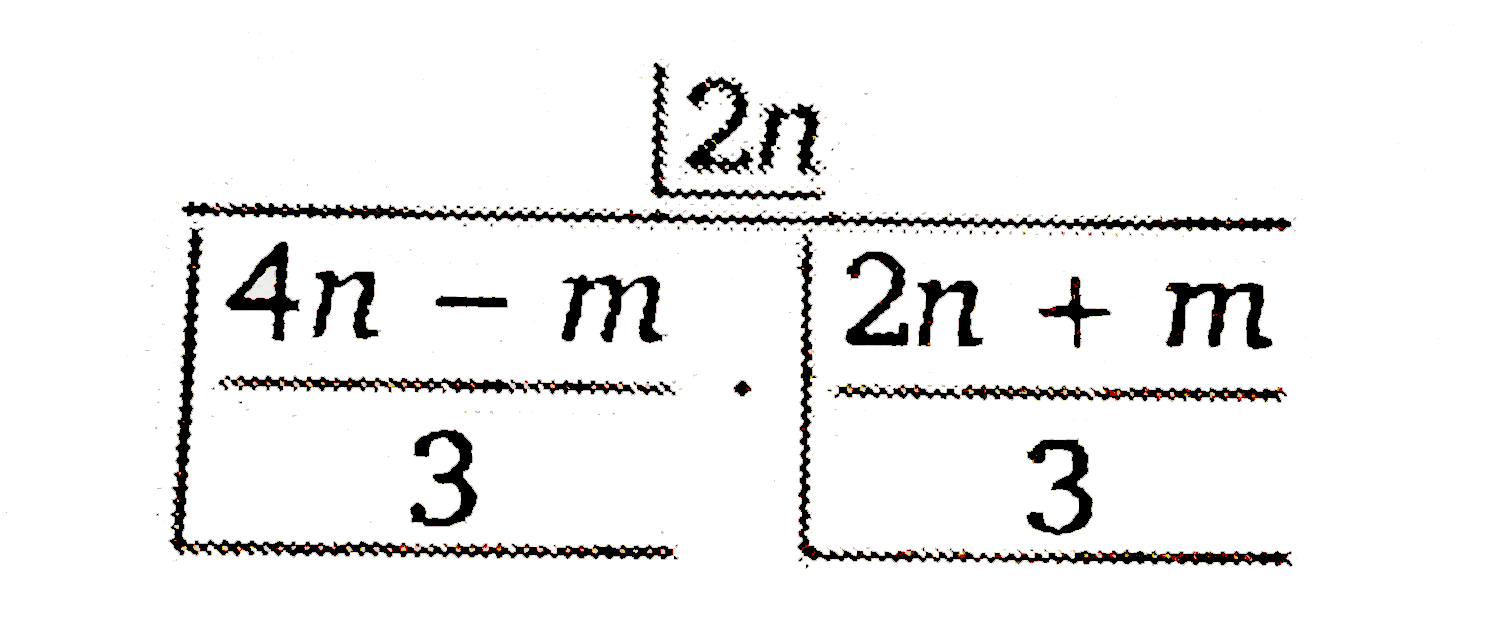Let m be the smallest positive integer such that the coefficient of in the expansion of is for some positive integer n. Then the value of n is
The correct Answer is:5
To solve the problem, we need to find the smallest positive integer m such that the coefficient of x2 in the expansion of
(1+x)2+(1+x)3+(1+x)4+…+(1+x)49+(1+mx)50
is equal to (3n+1)⋅(513) for some positive integer n.
Step 1: Identify the series
The expression consists of a series of binomial expansions. The first part of the series is:
(1+x)2+(1+x)3+(1+x)4+…+(1+x)49
This can be recognized as a geometric series.
Step 2: Calculate the sum of the geometric series
The sum of the series can be expressed as:
49∑k=2(1+x)k=(1+x)2⋅(1+x)48−1(1+x)−1
This simplifies to:
(1+x)2⋅((1+x)48−1)
Step 3: Expand and find the coefficient of x2
To find the coefficient of x2, we need to consider the contributions from both parts of the series:
1. From (1+x)2:
- The coefficient of x2 is 1.
2. From (1+x)48:
- The coefficient of x2 is given by (482)=48⋅472=1128.
Thus, the total contribution from the first part is:
1+1128=1129
Step 4: Contribution from (1+mx)50
Next, we need to find the coefficient of x2 in (1+mx)50:
Coefficient of x2=(502)m2=50⋅492m2=1225m2
Step 5: Total coefficient of x2
The total coefficient of x2 from the entire expression is:
1129+1225m2
Step 6: Set the equation
According to the problem, we have:
1129+1225m2=(3n+1)⋅(513)
Calculating (513):
(513)=51⋅50⋅493⋅2⋅1=23426
Thus, we can write the equation as:
1129+1225m2=(3n+1)⋅23426
Step 7: Rearranging the equation
Rearranging gives:
1225m2=(3n+1)⋅23426−1129
Step 8: Solve for m2
Dividing through by 1225:
m2=(3n+1)⋅23426−11291225
Step 9: Finding the smallest m
To find the smallest positive integer m, we need (3n+1)⋅23426−1129 to be divisible by 1225.
Step 10: Trial and error for n
We can try different values of n to find the smallest m:
1. For n=1:
(3⋅1+1)⋅23426−1129=4⋅23426−1129=93704−1129=92575
925751225 is not an integer.
2. For n=2:
(3⋅2+1)⋅23426−1129=7⋅23426−1129=164982−1129=164853
1648531225 is not an integer.
3. For n=3:
(3⋅3+1)⋅23426−1129=10⋅23426−1129=234260−1129=234131
2341311225 is not an integer.
4. For n=4:
(3⋅4+1)⋅23426−1129=13⋅23426−1129=304538−1129=304409
3044091225 is not an integer.
5. For n=5:
(3⋅5+1)⋅23426−1129=16⋅23426−1129=374816−1129=374687
3746871225=306.0 which is an integer.
Thus, the smallest positive integer m occurs when n=5.
Final Answer
The value of n is:
5
- The coefficient of x2 is 1.
- The coefficient of x2 is given by (482)=48⋅472=1128.
(3⋅1+1)⋅23426−1129=4⋅23426−1129=93704−1129=92575
925751225 is not an integer.
(3⋅2+1)⋅23426−1129=7⋅23426−1129=164982−1129=164853
1648531225 is not an integer.
(3⋅3+1)⋅23426−1129=10⋅23426−1129=234260−1129=234131
2341311225 is not an integer.
(3⋅4+1)⋅23426−1129=13⋅23426−1129=304538−1129=304409
3044091225 is not an integer.
(3⋅5+1)⋅23426−1129=16⋅23426−1129=374816−1129=374687
3746871225=306.0 which is an integer.
Topper's Solved these Questions
- Solutions of Triangle & Binomial TheoremBOOK - ALLENCHAPTER - Solutions of Triangle & Binomial TheoremEXERCISE - Do yourself -1
2 Videos
- Solutions of Triangle & Binomial TheoremBOOK - ALLENCHAPTER - Solutions of Triangle & Binomial TheoremEXERCISE - Do yourself -2
3 Videos
- Solutions of Triangle & Binomial TheoremBOOK - ALLENCHAPTER - Solutions of Triangle & Binomial TheoremEXERCISE - EXERCISE (J-M)
17 Videos
- SOLUTION AND PROPERTIES OF TRIANGLEBOOK - ALLENCHAPTER - SOLUTION AND PROPERTIES OF TRIANGLEEXERCISE - All Questions
106 Videos
- TRIGNOMETRIC RATIOS AND IDENTITIESBOOK - ALLENCHAPTER - TRIGNOMETRIC RATIOS AND IDENTITIESEXERCISE - All Questions
1 Videos
Similar Questions
Knowledge Check
The coefficients fo xn in the expansion of (1+x)2n and (1+x)2n−1 are in the ratio
A1:2B1:3C3:1D2:1
If n is a positive integer, find the coefficient of x−1 in the expansion of (1+x)n(1+1x)n.
View SolutionIf 'n' is a positive integer then prove that the coefficient foxm in the expansion of (x2+1x)2n is :

View SolutionIf 'n' is a positive integer then prove that the coefficient foxm in the expansion of (x2+1x)2n is :

View SolutionThe sum of the coefficients in the expansion of (1−x+x2−x3)n ,is
View SolutionThe smallest natural number n, such that the coefficient of x in the expansion of (x2+1x3)n is .nC23, is
View SolutionFind the sum of the coefficients in the expansion of (1+2x+3x2+nxn)2.
View SolutionIf |x|<1 , then the coefficient of xn in expansion of (1+x+x2+x3+…….)2 is
View Solution
